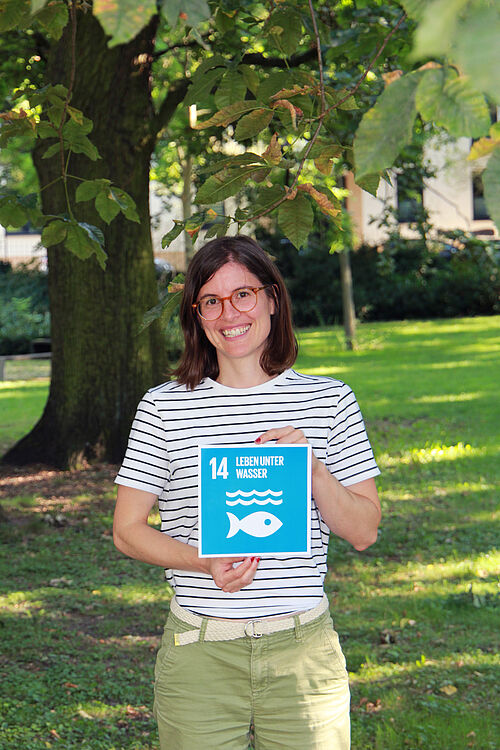
The 17 Sustainable Development Goals (SDGs) were drawn up by the United Nations in 2015 and formulate the goals for sustainable development for all countries in the world by 2030.
With our SDG-ambassador-program, we want to show you who is committed to these goals in concrete terms and on a daily basis here at the TU Braunschweig.
Today we would like to introduce you to Dr. Marta Perez-Rodriguez, who works at the Institute of Geoecology.
She is committed to the goal of “life under water” and answered a few questions for us.
How does your work relate to this SDG?
SDG 14 – Life below water aims to "Conserve and sustainably use the oceans, seas, and marine resources for sustainable development." As an environmental geochemist, my recent research has been dedicated to investigating the geochemistry of mercury and other metals in various aquatic ecosystems, spanning from freshwater to marine environments.
Human activities introduce a myriad of pollutants, including toxins, fertilizers, and heavy metals, into rivers, lakes, and oceans. Each of these pollutants has the potential to adversely affect underwater life, disrupt ecosystem health, and diminish biodiversity.
Mercury, particularly in its methylated organic form, methylmercury, poses a significant threat as it tends to accumulate and magnify within food chains, particularly in marine ecosystems. Consequently, this process impacts all aquatic organisms, from primary producers like phytoplankton to apex predators such as large mammals.; to finally reach the human food webs.
How did you become interested in this topic and where does your interest come from?
I've always felt a profound connection to the sea. I was born and raised in a city nestled along the shores of the Atlantic Ocean. Our daily rhythms, economic pursuits, leisure activities, and even our climate are intimately intertwined with the ebb and flow of the ocean. During my childhood, I immersed myself in the sport of sailing, spending countless hours navigating in the Atlantic Ocean, an experience that deepened my affinity for the maritime environment.
As my professional journey unfolded in Braunschweig, I was fortunate to continue fostering my love for the sea through an exhilarating project that led me aboard the esteemed oceanographic vessel, Polarstern. Renowned globally for its storied history in marine(Arctic) research, this opportunity not only allowed me to reconnect with the sea on a personal level but also enabled me to actively contribute to the study of marine ecosystems and their global significance
What led you to become involved in this SDG?
I felt deeply honored when the Green Office invited me to participate as an ambassador, as I quickly became engaged in the cause. Alongside my strong personal connection to the sea, I feel a profound responsibility towards future generations and the conditions they'll encounter in aquatic environments. The biodiversity and health of our aquatic ecosystems are suffering significant damage, directly impacting our society today.
Many toxic elements, such as the aforementioned methylmercury, enter the human diet through the consumption of marine and aquatic products, posing a serious threat to public health and the environment. While our societies afford us the luxury of choice in our diets, other communities with more limited access to food are particularly vulnerable to this type of pollution. It's crucial to understand how and which toxins enter food chains and to implement effective measures to reduce their presence in our aquatic ecosystems. This will not only safeguard human health but also preserve the richness of marine life for generations to come.
Is there a connection between your topic and other SDGs?
Water and the biodiversity it supports are essential pillars for maintaining a healthy environment and ensuring that future generations have access to this vital resource. I firmly believe that diverse and healthy ecosystems play a crucial role in fostering sustainable communities, contributing to achieving goals such as poverty eradication (SDG 1 - No Poverty), ensuring access to safe and nutritious food (SDG 2 - Zero Hunger), clean water (SDG 6 - Clean Water and Sanitation), and protecting terrestrial life (SDG 15 - Life on Land).
Furthermore, I believe it is the responsibility of industry and innovation (SDG 9 - Industry, Innovation and Infrastructure) to take measures to limit waste production that may harm aquatic life and communities. This entails promoting more sustainable industrial practices and fostering innovation in technologies and processes to reduce environmental impact, thereby ensuring the preservation of our valuable aquatic ecosystems for future generations.
What 3 words do you associate with this SDG?
Pollution, Biodiversity, Trophic Webs
What support would you like so that you can incorporate your SDG even more effectively into teaching and research in the future?
The ability to decide on research topics and support researchers in any field, as long as they maintain high standards of quality, even if they do not align with the University's strategic priorities, promotes diversity of knowledge within the institution. This enhances education by offering students a wide range of perspectives and experiences.
By allowing exploration of various topics, students have the opportunity to gain a deeper understanding of the environment and society from multiple angles. This diversity of approaches not only enriches their learning but also prepares them to tackle the complex and varied challenges of today's society
Vacancies of TU Braunschweig
Career Service' Job Exchange
Merchandising
Term Dates
Courses
Degree Programmes
Information for Freshman
TUCard
Technische Universität Braunschweig
Universitätsplatz 2
38106 Braunschweig
P. O. Box: 38092 Braunschweig
GERMANY
Phone: +49 (0) 531 391-0
